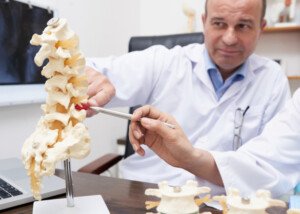
Irritable bowel syndrome (IBS) can cause back pain.
If you have back pain that has not responded to massage or other typical treatments, you may actually have IBS.
First of all, how does IBS even cause back pain in the first place?
Dr. Pejman Katiraei explains that he had a female patient in her 50s who suffered from back pain, along with other symptoms including chronic fatigue, allergies and migraines.
“Since other treatments were not working, she decided to go on a specialized water fast for three days,” says Dr. Katiraei, DO, FAAP, an integrative physician whose many areas of specialty include adult and pediatric IBS.
“Within two days, her back pain, muscle pain, allergies, and even hot flashes were gone.”
Was there a connection between the absence of food and the disappearance of the pain and other symptoms?
“To understand why this patient got better, we need to understand her IBS was tied to her back pain and all her other symptoms.
“I believe there is now ample evidence to show that people with IBS have inflammation or increased immune activity in their intestines. This inflammation is the reason for pain, diarrhea and most other symptoms.”
Think of the body as a whole unit, such that everything is connected; inflammation in one area of the body can cause a ripple effect: inflammation in another area … including the spinal area.
Eliminate inflammation in the intestines, and you will also eliminate inflammation in the back, says Dr. Katiraei.
How does the gut have anything to do with the back?
Nerves from the intestines go to the spinal cord.
“These nerves are also indirectly connected to the tissue in parts of our back. The inflammation in the intestines also irritates these nerves, which then causes irritation at the level of the tissue (skin) in the connected areas on the back.”
Massage therapists, chiropractors and osteopaths, who heal patients with their hands, can detect tissue change as a response to inflammation.
“So you may go to your chiropractor for back pain, and they may be astute enough to tell you that the pain is not from your back, but rather from your intestines,” says Dr. Katiraei.
This phenomenon also works in reverse. A problem with one’s back can cause intestinal issues.
“There are nerves that go from the spinal cord into the intestines. Some people who have back pain and some intestinal problems actually have some vertebrae that are out of place and impinging on the nerves, causing the nerves not to work perfectly, which then disrupts the signals to the intestines, causing the intestines to not work perfectly.
“The back pain may be due to these bones being out of place. So, sometimes a good adjustment by a chiropractor or osteopath can relieve a person’s back pain and subsequently the abdominal pain.”
Does this all sound confusing?
Dr. Katiraei confirms that this all, indeed, is complicated, and therein lies the problem … the problem a person with IBS has when it comes to finding a treatment that truly works.
“People are looking for a one-size-fits all solution, and it simply does not exist,” says Dr. Katiraei in reference to irritable bowel syndrome.
“When treatments for IBS are tailored to each person, it becomes very possible to effectively treat and perhaps even cure IBS!”



























